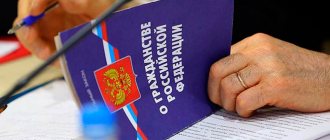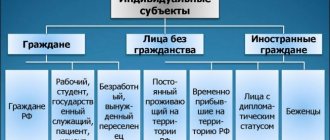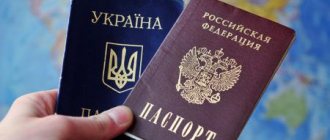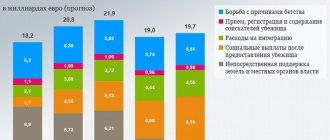Refugees are foreign citizens, and forced migrants have Russian citizenship, but otherwise their situation is similar - both of them changed their place of residence due to some real threat or hostile attitude towards them. If they are assigned the administrative legal status of refugees and forced migrants, the Government of the Russian Federation allows them to enjoy a number of privileges and benefits. From this article you will learn what the difference is between the status of a refugee and a forced migrant, what rights migrants have, how long the statuses are valid, why they can refuse to assign status, and for what reasons the status of a migrant can be lost.
Administrative legal status of refugees and internally displaced persons
Important! Forced migrants have the legal right to apply for a targeted loan for the purchase of residential premises or the construction of an individual house - the loan is provided on a long-term basis and without charging interest.
The administrative-legal situation refers to the system of rights and obligations, guarantees and freedoms that the Government of the Russian Federation provides to refugees and forced migrants, and migrants enjoy a wider range of rights due to the presence of Russian citizenship.
If a citizen submits a petition to assign him the status of a migrant, and it is registered and accepted for consideration on its merits by experts of the Main Directorate for Migration Affairs of the Ministry of Internal Affairs, according to Russian legislation, the person will receive the following rights due to him in connection with the status of a forced migrant:
- the right to receive free medical care and medicines in clinics and social pharmacies;
- the right to accommodation in a temporary residence center, free use of housing and communal services, and receiving food;
- the right to reimbursement of travel costs from the Main Department of Migration Affairs of the Ministry of Internal Affairs to the temporary accommodation center (if the displaced person is low-income - otherwise, the authorities only provide assistance in transporting luggage and ensuring the possibility of travel);
- the right to one-time financial support (at least 100 rubles).
IDPs, within 3 months from the date of confirmation of their new status, have the right to:
- choice of place of residence (the list will be proposed by employees of the Main Department of Migration Affairs of the Ministry of Internal Affairs);
- obtaining Russian citizenship on preferential terms.
Question 16. Administrative and legal status of refugees and internally displaced persons
A forced migrant is a citizen of the Russian Federation who left his place of residence as a result of violence or other forms of persecution committed against him or his family members, or due to a real danger of being persecuted on the basis of race or nationality, religion, language, as well as on the basis of belonging to a certain social group. group or political beliefs that became the basis for hostile campaigns against a specific person or group of people, mass violations of public order..."
1) a refugee is a person who is not a citizen of the Russian Federation and who, due to a well-founded fear of becoming a victim of persecution on the grounds of race, religion, citizenship, nationality, membership of a particular social group or political opinion, is outside the country of his citizenship and cannot to benefit from the protection of that country or, owing to such fear, is unwilling to avail itself of such protection; or, not having a nationality and being outside the country of his former habitual residence as a result of such events, is unable or unwilling to return to it owing to such fears;..."
The administrative-legal status of refugees and forced migrants in the Russian Federation is a system of rights, freedoms, guarantees and duties assigned in the field of public administration, as well as responsibility for failure to fulfill or improper performance of their duties, provided by the Russian state to refugees and forced migrants.
The administrative and legal status of refugees and internally displaced persons is a rather complex phenomenon that combines not only rights and obligations, but also other elements: principles, legal capacity, citizenship, guarantees, etc.
The content of the administrative and legal status of refugees and forced migrants, from the point of view of its internal structure, is determined by three elements: rights, duties and responsibilities.
The legal capacity of refugees and forced migrants has quite natural differences, which are due to the different nature of their legal connection with the host state. They may manifest themselves, for example, in the fact that the administrative legal capacity of a refugee arises from the moment he enters into legal relations with the Russian state (that is, a state of which he is not a citizen). This does not apply to forced migrants who, being citizens of the Russian Federation, are endowed with legal capacity from the moment of their birth.
The administrative capacity of refugees and forced migrants is the recognized ability of them to acquire: a) rights and obligations of an administrative and legal nature; b) the possibility of them exercising rights and obligations of an administrative and legal nature.
The administrative capacity of refugees and forced migrants may be regulated, in addition to the norms of Russian administrative legislation, by international treaties with the participation of the Russian Federation.
The scope of administrative capacity of refugees and forced migrants is determined by the scope of their administrative capacity. Moreover, the administrative capacity of refugees (who are mainly foreign citizens) is terminated due to their death or departure from Russia.
The administrative rights of refugees and forced migrants can be characterized as permissions enshrined in normative legal acts to perform certain actions, behave within permitted boundaries, demand from citizens, government bodies and their officials that they do not interfere with the implementation of these rights, but contribute to the creation of optimal opportunities for them implementation. Administrative responsibilities of refugees and forced migrants are the state’s claims to the behavior of this category of persons, expressed in the norms of administrative law.
The administrative responsibility of refugees and internally displaced persons should be understood as their responsibility to government authorities, and in cases directly provided for by law, to the court for a guilty violation of generally binding administrative legal norms. It is expressed in the application of established administrative penalties to violators.
Signs of administrative responsibility of refugees and internally displaced persons:
— occurs when a refugee or forced migrant commits an offense;
— established primarily by the norms of administrative law;
— the subjects of administrative responsibility are refugees and internally displaced persons;
- occurs out of court;
— the procedure for imposing punishment is regulated by administrative procedural rules;
- does not entail consequences in the form of a criminal record;
— plays a significant role in the prevention of crimes by refugees and internally displaced persons.
The legal status of forced migrants also has its own specifics. As a general rule, a forced migrant is a citizen of Russia. However, in accordance with the current domestic legislation, they may be a foreign citizen or a stateless person if they are legally present in the territory of our state. Consequently, the features of the legal status of forced migrants are determined by the set of rights granted to them by domestic legislation as citizens of the Russian Federation, foreign citizens and stateless persons, and the rights granted to a person by domestic legislation exclusively as a forced migrant.
Guaranteeing the administrative and legal status of refugees and internally displaced persons is a kind of external mechanism for limiting power, which always strives for self-expansion and strengthening its presence in all spheres of human life. Guarantees are necessary not only for the realization of the rights and freedoms of refugees and internally displaced persons, but also for their responsibilities. They can be divided into general and special. General guarantees act as certain economic, ideological, political conditions and prerequisites that actually ensure the possibility of realizing rights and obligations. Special (legal) guarantees should be understood as a set of legal norms by which the procedure for the implementation and protection of rights and obligations is regulated.
Rights and obligations of a person recognized as a refugee
1. A person recognized as a refugee and members of his family who arrived with him have the right to:
1) obtaining the services of an interpreter and obtaining information about their rights and obligations, as well as other information in accordance with this article;
2) obtaining assistance in preparing documents for entry into the territory of the Russian Federation if these persons are located outside the territory of the Russian Federation;
3) receiving assistance in ensuring travel and baggage to the place of stay in the manner determined by the Government of the Russian Federation;
4) receiving food and using utilities at a temporary accommodation center in the manner determined by the Government of the Russian Federation, before leaving for a new place of stay;
5) protection by representatives of the territorial body of the federal executive body for internal affairs in the temporary accommodation center in order to ensure the safety of these persons;
6) use of residential premises provided in the manner determined by the authorized federal executive body from the housing stock for temporary settlement.
(as amended by Federal Law No. 160-FZ of July 23, 2008)
A person recognized as a refugee and his family members lose the right to use residential premises from the housing stock for temporary settlement in the event of purchasing, receiving, or renting other housing;
7) medical and medicinal assistance on an equal basis with citizens of the Russian Federation in accordance with this Federal Law, other federal laws and other regulatory legal acts of the Russian Federation, unless otherwise provided by international treaties of the Russian Federation;
(as amended by Federal Law dated August 22, 2004 N 122-FZ)
 receiving assistance in referral for vocational training or employment on an equal basis with citizens of the Russian Federation in accordance with this Federal Law, other federal laws and other regulatory legal acts of the Russian Federation, except for cases provided for by the legislation of the Russian Federation and international treaties of the Russian Federation;
receiving assistance in referral for vocational training or employment on an equal basis with citizens of the Russian Federation in accordance with this Federal Law, other federal laws and other regulatory legal acts of the Russian Federation, except for cases provided for by the legislation of the Russian Federation and international treaties of the Russian Federation;
(as amended by Federal Law dated August 22, 2004 N 122-FZ)
9) employment or entrepreneurial activity on an equal basis with citizens of the Russian Federation in accordance with this Federal Law, other federal laws and other regulatory legal acts of the Russian Federation, except for cases provided for by the legislation of the Russian Federation and international treaties of the Russian Federation;
(as amended by Federal Law dated August 22, 2004 N 122-FZ)
10) social protection, including social security, on an equal basis with citizens of the Russian Federation in accordance with this Federal Law, other federal laws and other regulatory legal acts of the Russian Federation, laws and other regulatory legal acts of the constituent entities of the Russian Federation, except for cases provided for by law Russian Federation and international treaties of the Russian Federation;
11) receiving assistance in placing the children of a person recognized as a refugee in state or municipal preschool and general education institutions, educational institutions of primary vocational education, as well as in transferring them to educational institutions of secondary vocational and higher vocational education on an equal basis with citizens of the Russian Federation in accordance with this Federal law, other federal laws and other regulatory legal acts of the Russian Federation, laws and other regulatory legal acts of the constituent entities of the Russian Federation, unless otherwise provided by international treaties of the Russian Federation;
12) assistance from the federal executive body authorized to exercise control and supervision functions in the field of migration in obtaining information about the relatives of a person recognized as a refugee living in the state of his citizenship (his former usual place of residence);
(as amended by Federal Law dated July 18, 2006 N 121-FZ)
13) application to the territorial body of the federal executive body authorized to exercise control and supervision functions in the field of migration at the place of residence of the person and his family members in order to issue a travel document for travel outside the territory of the Russian Federation of these persons.
(as amended by Federal Law dated July 18, 2006 N 121-FZ)
The form of the travel document, the procedure for its registration, issuance and exchange are determined by the authorized federal executive body;
(as amended by Federal Law No. 160-FZ of July 23, 2008)
14) applying for the right to permanent residence on the territory of the Russian Federation or to acquire citizenship of the Russian Federation in accordance with the legislation of the Russian Federation and international treaties of the Russian Federation;
15) participation in public activities on an equal basis with citizens of the Russian Federation, with the exception of cases provided for by the legislation of the Russian Federation and international treaties of the Russian Federation;
16) voluntary return to the state of one’s citizenship (one’s former usual place of residence);
17) travel to a place of residence in a foreign country;
18) use of other rights provided for by the legislation of the Russian Federation and international treaties of the Russian Federation, as well as the legislation of the constituent entities of the Russian Federation.
2. A person recognized as a refugee and members of his family who arrived with him are obliged to:
1) comply with the Constitution of the Russian Federation, this Federal Law, other federal laws and other regulatory legal acts of the Russian Federation, as well as laws and other regulatory legal acts of the constituent entities of the Russian Federation;
2) arrive in a timely manner at a temporary accommodation center or other place of stay determined by the federal executive body authorized to exercise control and supervision functions in the field of migration, or its territorial body;
(as amended by Federal Law dated July 18, 2006 N 121-FZ)
3) comply with the established rules of residence and fulfill the established requirements of sanitary and hygienic standards of residence in the temporary accommodation center;
4) report within seven days to the territorial body of the federal executive body authorized to exercise control and supervision functions in the field of migration, information about changes in surname, name, family composition, marital status, about acquisition of citizenship of the Russian Federation or citizenship of another foreign state or on obtaining a permit for permanent residence in the territory of the Russian Federation;
(as amended by Federal Law dated July 18, 2006 N 121-FZ)
5) report your intention to change your place of residence on the territory of the Russian Federation or to leave for your place of residence outside the territory of the Russian Federation;
6) deregister with the territorial body of the federal executive body authorized to exercise control and supervision functions in the field of migration, when changing the place of stay and, within seven days from the date of arrival at the new place of stay, register with the territorial body of the federal executive body authorities authorized to exercise control and supervision functions in the field of migration.
(as amended by Federal Law dated July 18, 2006 N 121-FZ)
The paragraph is no longer valid. — Federal Law of July 18, 2006 N 121-FZ;
7) undergo an annual re-registration within the time limits established by the territorial body of the federal executive body authorized to exercise control and supervision functions in the field of migration.
(as amended by Federal Law dated July 18, 2006 N 121-FZ)
What is the difference between the administrative and legal status of refugees and internally displaced persons?
As already mentioned, refugees enjoy a smaller set of rights than internally displaced persons. The following are not available to refugees:
- queuing for the allocation of municipal housing;
- assistance from the authorities in enrolling teenagers in Russian universities;
- scholarship payments for receiving vocational training or retraining;
- free subsidies for purchasing an apartment or building a house.
Refugees whose status has been officially recognized receive the following privileges:
- for social protection and social security benefits;
- to open a business without first obtaining a special permit;
- for hired employment;
- participation in social activities.
How long does the administrative legal status of refugees and internally displaced persons last?
Important! Despite the fact that the procedure for assigning refugee and forced migrant status is not much different, the duration of the status for both categories of persons is different.
The status of a forced migrant or refugee is not assigned for life - it has a limited validity period:
- Refugee status is valid throughout the entire period of residence of a person on the territory of Russia, if he does not violate the laws, and if there are no reasons for depriving him of this status. The refugee submits a national identity card, and the refugee ID becomes his “passport” in Russia until he decides to leave the country.
- Forced migrant status is valid for 5 years. However, if a citizen has compelling reasons for extending his status, it can be renewed every year.
Legal status of refugees and internally displaced persons
The legal status of these two categories of migrants differs in the conditions and terms of provision, the list of rights received by the migrant, as well as the reason for deprivation of status.
Refugees are people who left the country as a result of persecution for one reason or another and do not want to return to their homeland. Forced migrants leave one region of the country and move to another because of persecution or violence committed against them.
Forced migrant certificate
Normative base
The legal statuses of both categories are regulated by the following legislative acts:
- Law of the Russian Federation of February 19, 1993 No. 4530-1 “On forced migrants”;
- Law of the Russian Federation of February 19, 1993 No. 4528-1 “On Refugees”.
Also, the protection of the rights of political refugees is guaranteed by Art. 63 of the Constitution of the Russian Federation, operating on the basis of the UN Geneva Convention. Issues related to the provision of social housing to these groups of migrants are regulated by Art. 108 Housing Code of the Russian Federation.
Grounds for recognition
For the reasons given, these concepts are as close as possible: both refugees and internally displaced persons are recognized as persons who left their homes due to a threat to life and health for reasons of race, ethnicity, political affiliation, or for reasons of religious or social hostility.
People who left their homes due to:
- Man-made disasters;
- Natural Disasters;
- Military actions, etc.
Differences between refugees and migrants
You may also like
1
Filling out the form to participate in the program...
6 883
The legal statuses of the two categories of migrants differ in the subjects to whom they apply:
- A forced migrant is always a citizen of the Russian Federation, a refugee is always a citizen of another state or is a stateless person;
- A forced migrant leaves one subject of the federation and moves to another, a refugee arrives on the territory of the Russian Federation from abroad.
Rights and responsibilities of migrants
The rights of individuals after they acquire status also differ somewhat. All rights and obligations of citizens of the Russian Federation apply to forced migrants. They have the right:
- Participate in elections and referendums;
- Work as state and municipal employees;
- Receive subsidies for the purchase of housing and apply for improved living conditions.
Refugees do not have Russian citizenship, and therefore do not have the right to participate in elections or work in the civil service. They also cannot:
- Receive scholarships during your studies;
- Apply for housing;
- Count on free subsidies for the purchase or construction of residential properties.
Validity periods
Forced migrant status is issued to a person for a 5-year period. After its expiration, the status is renewed annually, provided that the citizen has not purchased housing.
Refugee status is granted for an indefinite period. Once every year and a half, persons with this status must undergo re-registration with the body that granted it. Based on the results of the review, the status is confirmed or canceled due to changes in essential conditions.









